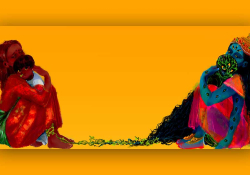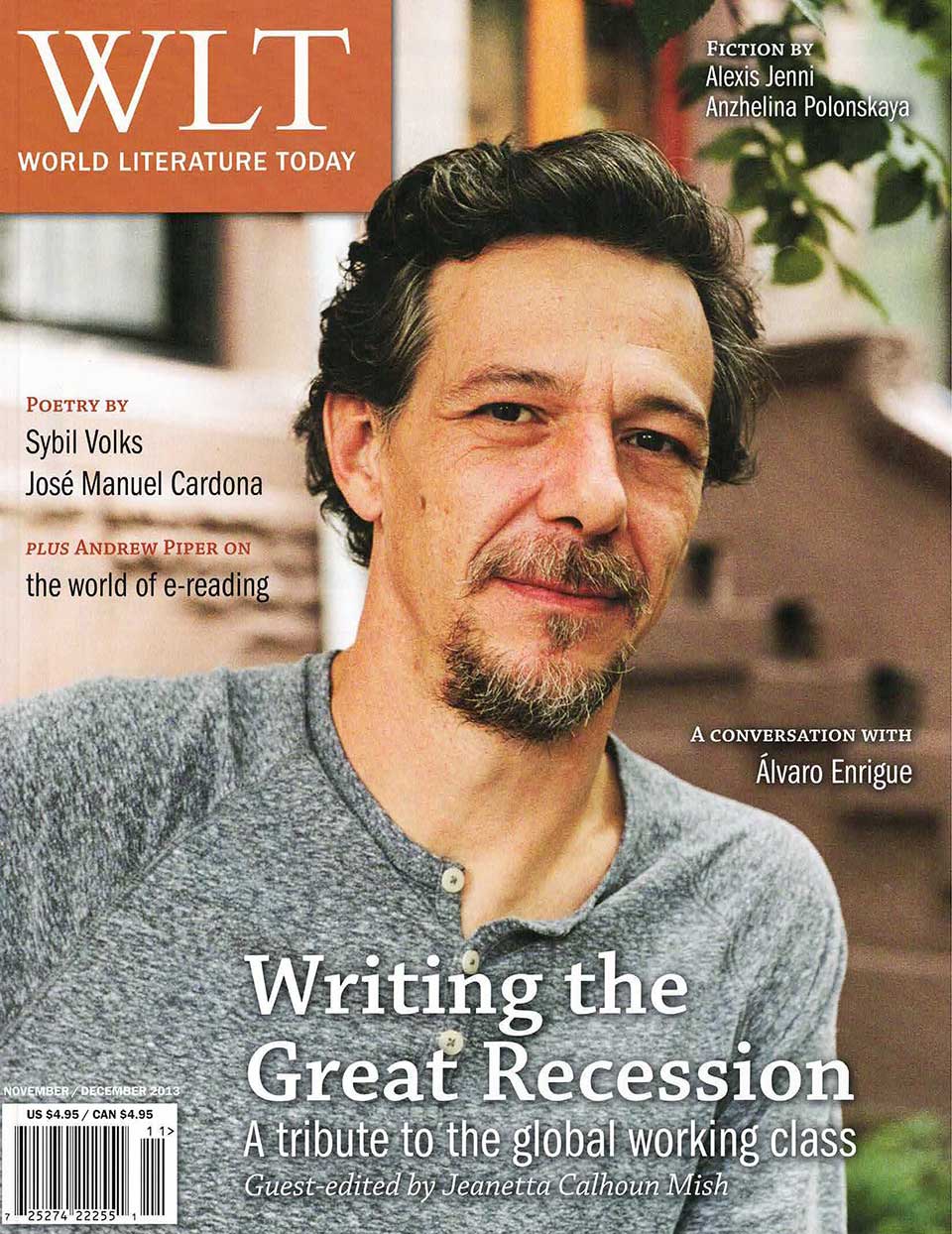Anyone Can Be Replaced (an excerpt)

In contrast to Michela Murgia’s Il mondo deve sapere (see WLT, Nov. 2013, 43–46), Peppe Fiore’s Nessuno è indispensabile (Anyone can be replaced) is sardonic, even cynical, and Fiore’s protagonist is not a young and disarming telemarketer but Michele Gervasini, the disillusioned, thirty-six-year-old comptroller of the fictional Montefoschi company, “the third largest producer of milk and dairy products in all of Italy.” Gervasini’s philosophy, to the extent he has one, might be summed up in the novel’s tagline: “Your co-workers are human beings . . . up to a point.”
In terms of workplace culture, Montefoschi is not so far removed from the Kirby Company’s call center, and Gervasini might be described as the poisoned fruit of the tree Murgia describes: a decade of “unstable” employment and of bending his needs to accommodate his employers. He’s unhappy and alone—a sexist, would-be womanizer who spends much of his free time unsuccessfully navigating online dating sites.
Fiore is also connected to Murgia in his lacerating perspective on the true nature of work: “Awkward and colorless, [Gervasini is] always just a step away from that career-changing promotion, and every breath he takes is the demonstration of a solemn truth: man is the only animal who, thanks to work, freely chooses to make himself a slave for life.”
In this excerpt, Adele Simioli, a twenty-five-year-old intern, has just arrived at Montefoschi, and Gervasini has invited her to accompany him to the grand-opening festivities of his cousin’s new auto dealership.
Gervasini wasn’t much of a drinker. After two glasses of sangria on an empty stomach, one right on top of the other, he was dizzy, and a nauseating, syrupy aftertaste filled his throat. At the same time, what he felt wasn’t entirely unpleasant: his legs floppy against the wall where he and Adele had perched, his exhausted body, and the feeling that his head was simultaneously an enormous weight and about to float away. Adele’s temple rested against his shoulder. Yes, in some unballasted and slightly ridiculous way, the sensation wasn’t entirely unpleasant.
For her part, Adele had downed no less than ten glasses of sangria, following them for good measure with a dose of Amaretto di Saronno. She hadn’t reached the point of being unable to stand, but she was definitely drunk. For Gervasini, this fact was not precisely a problem. If nothing else, at least she had shut up. That was in contrast to the preceding hour in which she had delivered an autobiographical soliloquy that covered every single high (and low) point of the last six years of her life.
Adele had arrived in Rome in September 2004. She’d spent the first four years of her university career in a two-room apartment on Via Prenestina that she shared with a cousin who was studying to be a nurse. From that vantage point, Rome was a series of cement pylons on the ring road decorated in blood-red spray paint: TEAR DOWN THE OVERPASS! It was Tram #19 at nine in the morning and again at seven at night and the immutable odor of fried food and curry that seemed to cling to the Sri Lankans in her building. It was the old men who ogled her from head to foot on the tram, the old women who’d slit your throat for a seat. It was the shelves of the discount store with tuna in white-label cans marked “TUNA” and beer in half-liter containers that cost sixty cents. In other words, it was a Rome rather different from what she had imagined. But Adele had dug in her heels: it was enough to have left behind the piles of bare concrete and the clumps of heroin addicts at the ass-end of Calabria that had given birth to her. She’d grown up believing that Soverato was an urban planner’s attempt to represent, in physical form, the total negation of any conceivable future. Admittedly, the future that unfolded before her now on Via Prenestina was uncertain, wobbly, and, in some ways, potentially even dangerous. (Adele had accumulated an encyclopedic knowledge of every female university student massacred in Italy over the last decade.) But at least it was a future. All it needed was some domestication.
One Friday evening in 2005, Adele had come home to find her cousin packing a suitcase. She presumed her cousin was headed home to Calabria for the weekend and felt slightly put out to have the news sprung on her in that way. But the truth was that Adele’s cousin, who really was leaving the following morning, wasn’t going to Soverato. She was going to Santo Domingo, where she and the guy she’d been seeing were planning to open up a pub that sold Italian antipasti and wine. Prior to that moment, no one in Adele’s family had the slightest inkling of the existence of this man—he worked at the internal revenue bureau, had been married fifteen years, and was supporting three children—least of all Adele herself, who was supposedly her cousin’s best friend.
In the years that followed, the cousin’s former room was alternately occupied by, in order of appearance: an aspiring photographer from Sessa Aurunca in the Province of Caserta, complete with dreadlocks and a hobo-dog that demolished every chair in the house; an aspiring investigative journalist with anorexia who was majoring in communications and had been flunking the same course in English for the past three years; an aspiring theater actress whose boyfriend was a poet-slash-heroin addict; an aspiring lawyer from Bologna who said she was an associate at a law firm in Prati, though Adele later discovered that the closest she’d ever gotten to the law was her impressive criminal record; and an aspiring press secretary with purse and eyeglasses by Prada and with whom Adele had engaged in a single, succinct conversation regarding her opinion (the roommate’s, that is) that the only way for a woman to get ahead in Rome was to put out. That one lasted five days before disappearing.
They were young women, there were a lot of them, and none of them knew how to do a fucking thing. They’d been a pack of talentless, aspiring-something-or-others who swarmed to Rome from unimaginable places in order to advance pipe dreams of every conceivable variation, all of which were eternally destined to vanish into the “I wish I could” skies the moment they touched down in Rome: aromatherapy courses, music pounding through the walls from the adjacent room, overcooked spaghetti dinners at four in the morning, months and months of half-assed participation in Erasmus exchange programs, and boyfriends who were invariably both assholes and out of their minds. Adele had been forced to come to terms, and the conclusion she’d reached was: they were just too different from her. She wasn’t in Rome for a good time. She was there to get away from Soverato and build some shred of a future for herself. And Adele wasn’t just aspiring, she was putting in the work. As a result, the living situations all ended in more-or-less the same way: her roommates would vanish, leaving a month’s rent due and the utility bills unpaid. A couple of times they’d even carried off her cosmetics bag.
The day of her graduation from the university, ill at ease among her ill-at-ease relatives in a restaurant on the shores of Lake Bracciano—a rather pretentious place without, it seemed to Adele, much to pretend to—Adele made her peace with all those girls and forgave them. She forgave every last one of them. Now that she never had to see them again, her worthless roommates struck her as a sort of test imposed by life, a chance to demonstrate how much she truly did deserve a future. She drank too much and, on the way back to Rome, they had to pull the car over on the Via Appia while Adele puked discreetly behind an oleander bush.
A week later, her first job interview ended badly. It was for an unpaid internship in the marketing department of a multinational manufacturer of household products. The woman from human resources looked exactly like Nicole Kidman, and all Adele could think about—for the entire time she sat on the outrageously uncomfortable designer chair in the director’s office—was the way her own enormous nose protruded from the middle of her face like a ski boot. In Gallarate, the first question the CFO of the cement plant asked her (he’d called her about a job as his assistant) was whether she had a boyfriend.
So Adele did her best to grin and bear it through a three-month traineeship in a market-research firm, which included a bonus fling with a coworker who seemed polite, well mannered, and harmless enough but who turned out to be a sadomasochist with a fetish for cigarette burns. Her last interview was with a big-name consulting firm, exactly the kind of work she’d been looking for. That one didn’t go well either, but this time it was Adele’s fault. No sooner had she walked in than she slammed out again, having caught a glimpse of the young woman in the Armani suit who was supposed to interview her. It was the aspiring press secretary who’d spent five nights in Adele’s apartment.
That’s why she was so pleased for the opportunity to intern with a company like Montefoschi, where people were treated like human beings and not like objects. Actually getting taken on permanently would have been a dream come true, even though they’d warned her during her interview that she shouldn’t let her expectations run wild. Résumé or no résumé, the economy was still in crisis, after all.
But Adele hadn’t given up hope.
At some point Gervasini realized why Adele hadn’t made a sound for the last ten minutes. She had fallen asleep. He picked up the plastic cup still half full of Amaretto di Saronno that Adele had left on the wall and tossed back its contents. When he put down the cup again, he inadvertently brushed against Adele’s right knee. She muttered something and shifted closer. Her smell was sweet yet sharp.
And so it was, as the grand-opening festivities of the Gervasini Auto Dealership, Via Salaria Branch, came to a climax (a seriously top-heavy woman had climbed onto the roof of her sensible car and was slinging thirty kilos of tits around in time to a salsa beat while her fellow partygoers formed a ring around her, all of them shouting and half-crazed; elderly women lifted the hems of their skirts to expose bloated white thighs and varicose veins; and an old guy in his sixties—well preserved thanks to tanning lamps, facelifts, and Swedish massage but still a representative specimen of a human male in his seventh decade—was so taken by the moment that he pulled off his white linen shirt and danced in his white linen pants) . . . so it was, as this kermesse unfolded around him, that Gervasini recalled Adele’s words. And he experienced, for the first time in his life, the degree to which another human being, viewed in the context of specific events, could look precisely like an object.
Translation from the Italian
By Wendell Ricketts
Editorial note: From Nessuno è indispensabile, by Peppe Fiore (Einaudi, 2012). Copyright © 2012 by Giulio Einaudi Editore S.p.A. English translation copyright © 2013 by Wendell Ricketts.










